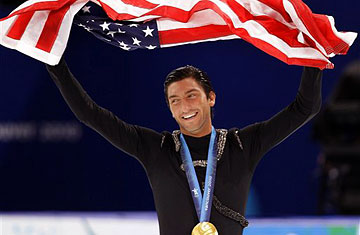
American Evan Lysacek skates during the victory ceremony after winning the gold medal at the Vancouver Olympics on Thursday, Feb. 18
(2 of 2)
As a skater, the reason for quad queasiness is simple. If you can't land it, it's not worth even trying under the current scoring system. A quadruple toe loop jump, the most popular version of a four-revolution jump, gives you a base score of 9.8 points. You can add on a point or two for performing it well or lose a few points for bobbling the landing, but 9.8 is what the judges start with. A triple-triple jump combination yields 10 base points, without the hammering on your ankles and the angst of launching yourself into four revolutions over a sheet of unforgiving ice. Plus, if you fall on the quad, it's an automatic 1.0-point deduction and a downgrade of the jump to however many rotations you actually completed, not to mention those deductions for not executing the jump. "What it would take to make it less risky and more rewarding for people to try it would be not penalizing them for falling or under-rotating the jump as much as they do," says Wylie.
The quad is only the most glamorous example of what the sport might be losing if the penalties for trying one aren't reduced somehow, whether by awarding four-revolution jumps higher base points or by reducing the penalties for skaters who try and flub them. Plushenko, one of the most consistent quad jumpers around, landed a quadruple toe loop jump in the early seconds of his program and still came up short of the gold on Thursday, earning a silver. He has been outspoken all week about how he feels about the quad jump. "I believe that the quad is the future of figure skating. The quad is necessary ... Not doing the quad will be going backwards in time," he said after the men's short program on Tuesday, in which he was the only skater to land a quad cleanly. Following his silver-medal finish, he was pessimistic about the place the quad would have in the new system but remained adamant that such innovations be recognized and rewarded. "I was sure that I had won my second Olympic Games," he said. "But my basic position and attitude is that movement must go forward — never stop, never go back."
Bronze medalist Daisuke Takahashi agreed. "For me, the ideal skate would have to include a quad on my part," he said after his performance in Vancouver. "Although I did attempt the quad and it wasn't successful, I do not regret it at all. It's a challenge to me, and good experience."
The reality, however, is that the past two world champions earned their titles without a quad, and now, after three consecutive Olympic champions winning with programs that included a successfully landed quad, Lysacek has won without one. It's no coincidence that all of these titles were won under the new scoring system. And Lysacek himself couldn't have articulated better how the new rules may be pushing elements like the quad into the deep freeze. "I used to really enjoy training the quad, and I thought it was really important to try it in every competition," Lysacek said after the short program on Tuesday. "But several times I fell. Then I broke my foot, and it became less fun and more scary. [Now] the risk of injury is definitely there. So I decided to lay off that pressure on the left foot and try to make it through these Games successfully."
It was a strategy that certainly paid off on Thursday, making him the U.S.'s first Olympic men's skating champion since Brian Boitano in 1988. But at some point, amid all the calculating and constructing, you start to miss the good old-fashioned bravado that's a big part of any competition. "When you show up to a figure-skating event, if you don't have the hardest jump, from the time you're a little boy, you are apologizing a little bit," says Wylie. "I remember being little and showing up at competitions, and everyone asked, 'What jumps do you have?' " What answer will skating have in another four years?
